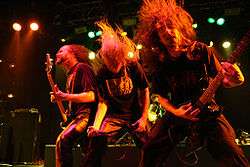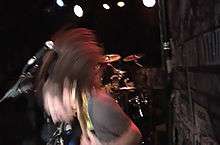Headbanging

Headbanging is violently shaking one's head in time with music, most commonly in the rock, punk and heavy metal music genres. Headbanging is sometimes used by musicians on stage.
Origin
The origin of the term "headbanging" is contested. It is possible that the term "headbanger" was coined during Led Zeppelin's first US tour in 1969.[1] During a show at the Boston Tea Party, audience members in the first row were banging their heads against the stage in rhythm with the music.
Furthermore, concert footage of Led Zeppelin performing at the Royal Albert Hall January 9, 1970 on the Led Zeppelin DVD released in 2003, the front row can be seen headbanging throughout the performance.[2]
Ozzy Osbourne and Geezer Butler of Black Sabbath are among the first documented headbangers, as it is possible to see on a band's concert in Paris, 1970.[3]
Lemmy from Motörhead, however, said in an interview on the documentary The Decline of Western Civilization II: The Metal Years, that the term "Headbanger" may have originated in the band's name, as in "Motorheadbanger".
Ian Gillan, frontman of Deep Purple, when asked if he invented headbanging, said: "That’s a definite possibility", although he claimed that "it was not really head banging — more hair floating".[4]
The practice itself and its association with the rock genre was popularized by guitarist Angus Young of the band AC/DC.[5]

Health issues
In 2005, Terry Balsamo, Evanescence guitarist, incurred a stroke which doctors postulated may have been caused by frequent headbanging.[6] In 2007, Irish singer and former Moloko vocalist Roisin Murphy suffered an eye injury during a performance of her song "Primitive" when she headbanged into a chair on stage.[7] In 2009, Slayer bassist/vocalist Tom Araya began experiencing spinal problems due to his aggressive form of headbanging, and had to undergo anterior cervical discectomy and fusion.[8][9] In 2011, Megadeth guitarist Dave Mustaine said that his neck and spine condition, known as stenosis, was caused by many years of headbanging.[10] Slipknot Sampler Craig Jones once suffered from whiplash after an extended case of powerful headbanging.
Several case reports can be found in the medical literature which connect excessive headbanging to aneurisms and hematomas within the brain and damage to the arteries in the neck which supply the brain. More specifically, cases with damage to the basilar artery,[11][12] the carotid artery[13] and the vertebral artery[14] have been reported. Several case reports also associated headbanging with subdural hematoma,[15][16] sometimes fatal,[17] and mediastinal emphysema similar to Shaken Baby Syndrome.[18] An observational study comparing headbanging to non-headbanging teenagers in a dance marathon concluded that the activity is associated with pain in varying parts of the body, most notably the neck, where it manifests as whiplash.[19]
See also
| Wikimedia Commons has media related to Headbanging. |
- Dutty Wine
- Moshing
- Stage diving
- Crowd surfing
- Sign of the horns
- List of dances
- Headbangers Ball
- Heavy metal music
- Heavy metal subculture
- Punk rock
- Hard rock
- Headbanger (disambiguation)
References
- ↑ Lewis, Dave; Pallett, Simon. Led Zeppelin: Concert File. Omnibus Press. ISBN 1-84449-659-7.
- ↑ "Led Zeppelin - Communication Breakdown - Royal Albert Hall 1970". YouTube. 15 October 2007. Retrieved 23 February 2015.
- ↑ "Black Sabbath Paris 1970 Live Full Concert". YouTube. 10 August 2013. Retrieved 23 February 2015.
- ↑ Ian Gillan & Ian Paice Interview with Simon Copeland from The Sun, March 2007 deep-purple.net. 2007. Retrieved on 2009-09-03.
- ↑ "Yahoo". Yahoo. Retrieved 23 February 2015.
- ↑ Evanescence Guitarist: Filling Ben Moody's Shoes | Interviews @ Ultimate-Guitar.Com
- ↑ Roisin Murphy’s Head-Banging-Accident iheartberlin.de. 30 October 2007. Retrieved on 24 August 2012.
- ↑ Slayer Frontman Tom Araya To Undergo Back Surgery, American Carnage Tour To Be Rescheduled metealunderground.com. 7 January 2010. Retrieved on 4 August 2012.
- ↑ "No more headbanging for mortal Slayer frontman". The San Francisco Examiner. Retrieved 23 February 2015.
- ↑ "Ouch! Headbanging Hurts…". cbslocal.com. Retrieved 23 February 2015.
- ↑ Edvardsson, Bengt (7 Jul 2011). "Head banging associated with basilar artery thrombosis". Neurology India. 59: 478–9. doi:10.4103/0028-3886.82756. PMID 21743194. Retrieved 28 Aug 2014.
- ↑ Rajasekharan, Chandrasekharan (2013). "Basilar artery thrombosis due to head banging: hazard of a religious ritual". BMJ Case Reports. 2013: bcr2013009840. doi:10.1136/bcr-2013-009840. Retrieved 28 Aug 2014.
- ↑ Jackson, M.A. (1983). ""Headbanging" and carotid dissection". British Medical Journal (Clinical Research Ed). 287: 1262. doi:10.1136/bmj.287.6401.1262. PMC 1549725
 . PMID 6416361.
. PMID 6416361. - ↑ Egnor, M.R. (1991/1992). "Vertebral Artery Aneurysm – A Unique Hazard of Head Banging by Heavy Metal Rockers". Pediatric Neurosurgery. 17: 135–138. doi:10.1159/000120583. Retrieved 28 Aug 2014.
- ↑ Neyaz, Z. (2006). "'Head banging' during rock show causing subdural hematoma". Neurology India. 54: 319–20. doi:10.4103/0028-3886.27172. PMID 16936407. Retrieved 28 Aug 2014.
- ↑ Islamian, Ariyan Pirayesh (5 Jul 2014). "Chronic subdural haematoma secondary to headbanging". The Lancet. 384: 102. doi:10.1016/S0140-6736(14)60923-5. Retrieved 28 Aug 2014.
- ↑ Mackenzie, J.M. (7 Dec 1991). ""Headbanging" and fatal subdural haemorrhage". The Lancet. 338: 1457–1458. doi:10.1016/0140-6736(91)92757-S. Retrieved 28 Aug 2014.
- ↑ Matsuzaki, Saeko (Dec 2012). "Mediastinal Emphysema After Head-Banging in a Rock Artist: Pseudo Shaken-Baby Syndrome in Adulthood". The Annals of Thoracic Surgery. 94: 2113–2114. doi:10.1016/j.athoracsur.2012.05.054. Retrieved 28 Aug 2014.
- ↑ Kassirer, Marilyn (Jun 1993). "Head Banger's Whiplash". The Clinical Journal of Pain. Retrieved 28 Aug 2014.